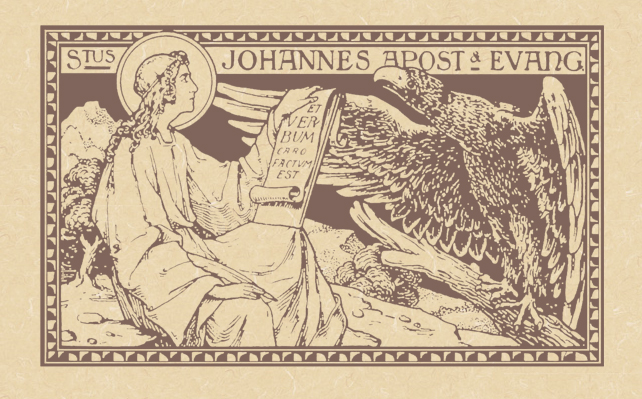Love Is a Many Splendored Thing.
The Sixth Sunday of Easter.
Lessons from the secondary dominica, according to the ordinary form of the Roman Rite:
• Acts 10: 25-26, 34-35, 44-48.
• Psalm 98: 1-4.
• I John 4: 7-10.
• John 15: 9-17.
The Fifth Sunday after Easter.
Lessons from the dominica, according to the extraordinary form of the Roman Rite:
• James 1: 22-27.
• John 16: 23-30.*
The Sunday of the Man Born Blind; and, the Feast of the Holy Apostle Simon the Zealot.
First & third lesson from the pentecostarion, second and fourth lesson from the menaion, according to the typicon of the Byzantine-Ruthenian Rite:
• Acts 16: 16-34.
• I Corinthians 4: 9-16.
• John 9: 1-38.
• Matthew 13: 54-58.
FatherVenditti.com
|
9:03 AM 5/10/2015 — I remember, at some point last year, mentioning how the Blessed Apostle John, in his account of the life of our Blessed Lord, plays fast and loose with the chronology of events, compressing a public life of three years into one, and often rearranging events so as to follow certain themes.  The Gospel lessons from his Gospel presented to us at Holy Mass during the last week all purport to come from our Lord's last discourse to His Apostles at the last supper, beginning with last Sunday's Gospel lesson in which He gives them an image of His relationship to them as that of a vine and its branches, portions of which were repeated at Mass during the week; and, in yesterday's Mass we heard what Saint John offers as the conclusion of the first of three parts to that speech, in which our Lord reminds his disciples that the hatred the world has for Him will translate to whomever follows Him, so that they should expect to endure persecution. The Gospel lessons from his Gospel presented to us at Holy Mass during the last week all purport to come from our Lord's last discourse to His Apostles at the last supper, beginning with last Sunday's Gospel lesson in which He gives them an image of His relationship to them as that of a vine and its branches, portions of which were repeated at Mass during the week; and, in yesterday's Mass we heard what Saint John offers as the conclusion of the first of three parts to that speech, in which our Lord reminds his disciples that the hatred the world has for Him will translate to whomever follows Him, so that they should expect to endure persecution.
Comparing these chapters of John's Gospel with the other three Gospels, it's pretty clear that Saint John has taken sayings and sermons said by our Lord at various times during His public ministry and inserted them into his Last Supper narrative as a form of poetic license;—it is unreasonable to assume that our Lord's Apostles could have sat through a dinner speech of this length at one sitting without some sort of intermission—but, we must admit that, rearranged by Saint John, outside of their original context, our Lord's words do take on a whole new meaning. This is wholly consistent with the thematic thrust of John's Gospel, which is concerned not so much with presenting the facts of our Blessed Lord's life, as are the other three, but with serving more as a theological and spiritual reflection on the life of our Lord. John, after all, was the last survivor of the original twelve; his Gospel was written after most of his brother Apostles were dead. In the twilight of his years, he pens his Gospel, along with the Book of Revelation, to serve as a final testament to the meaning of our Lord's life on earth; and, many of the themes found in those books are mirrored by his own Epistles to the Churches that he had established.
So, today we have lessons from both, and it would be easy to misinterpret them without understanding the Evangelist's particular method. Both our second lesson and the Gospel lesson we just heard overdose on the word “love”; and, without recognizing how the Evangelist put all this together, we might be tempted to simply view today's lessons as nothing more than a collection of lovey-dovey warm fuzzies intended to just make us feel better: “…let us love one another, because love is of God. […] He loved us and sent his son as expiation for our sins” (cf. I John 4: 7-10 NABRE). “As the Father loves me, so I also love you. …[L]ove one another as I love you. No one has greater love than this, to lay down one's life for one's friends.” (cf. John 15: 9-17 NABRE). To view all this simply as a collection of feel-good sayings about love would be to relegate our Lord's words to the level of some sort of self-help book.
In this sense, the Roman Missal does us a disservice: today's Gospel lesson ends on what someone obviously regarded as the perfect climactic punch-line: “This I command you: love one another” (v. 17 NABRE); but, what is left out of today's Gospel lesson is the very next verse, probably taken by Saint John from some other event in the life of our Lord, but which he includes in his Last Supper narrative, continuing with the words, “If the world hates you, be sure that it hated me before it learned to hate you” (v. 18 Knox).  And, if we take Saint John's method of taking these sayings out of context as inspired by God for a purpose—which we must, since it is a Gospel accepted by the Church—then we must accept, as well, the artificial context provided by John, which has a purpose different from the more chronological approach taken by the other Evangelists. John, after all, has already seen nearly all of his brother Apostles murdered by the enemies of Christ. He has already seen the various Churches they established ripped apart by dissension and heresy. He has already seen the spectacle of Christians turning on one another, denouncing one another, appealing to Peter against one another. Part of that whole saga is continued from the lessons of the previous week in today's first lesson from Acts, which concludes the whole history of Paul, Barnabas and Cornelius at the First Council of Jerusalem, arguing over the whole Gentile question. And, if we take Saint John's method of taking these sayings out of context as inspired by God for a purpose—which we must, since it is a Gospel accepted by the Church—then we must accept, as well, the artificial context provided by John, which has a purpose different from the more chronological approach taken by the other Evangelists. John, after all, has already seen nearly all of his brother Apostles murdered by the enemies of Christ. He has already seen the various Churches they established ripped apart by dissension and heresy. He has already seen the spectacle of Christians turning on one another, denouncing one another, appealing to Peter against one another. Part of that whole saga is continued from the lessons of the previous week in today's first lesson from Acts, which concludes the whole history of Paul, Barnabas and Cornelius at the First Council of Jerusalem, arguing over the whole Gentile question.
So, when Saint John finally pens his Gospel, he's reflecting not only on the life of our Blessed Lord as he remembers it, but on everything that's happened in the life of the Church since, much of which was not pretty.
Which brings us to the here and now. We live in an age of a new persecution against the Church. Not since the days of Nero have Christians been persecuted as they are today, rounded up and put to death simply because they refuse to renounce the Lord. At the same time, many seem to be attacking the Church from within, attacking fundamental dogma, questioning doctrines clearly revealed by Christ, tying to pretend that a new Pope and a new age with new challenges can somehow mean that everything is up for grabs and that we can reinvent the Church as we see fit. What's important for us to realize, however, is that Saint John, setting down his Gospel for posterity, was seeing exactly the same thing happening; and, when we realize that, it causes us to see that the Church survived it all before, and will survive it again.
If the world hates you, be sure that it hated me before it learned to hate you. If you belonged to the world, the world would know you for its own and love you; it is because you do not belong to the world, because I have singled you out from the midst of the world, that the world hates you. Do not forget what I said to you, “No servant can be greater than his master.” They will persecute you just as they have persecuted me; they will pay the same attention to your words as to mine [in other words, none]. And they will treat you thus because you bear my name… (John 15:18-21 Knox).
Let us promise our Lord today that, no matter how much we may be asked to endure for being faithful to Him, we will bear it patiently and without complaining, certain in the hope that the final victory will always be His … and ours.

* In the extraordinary form of the Roman Rite, from Easter Saturday until the end of Paschaltide, the Gradual Psalm is omitted.
|

